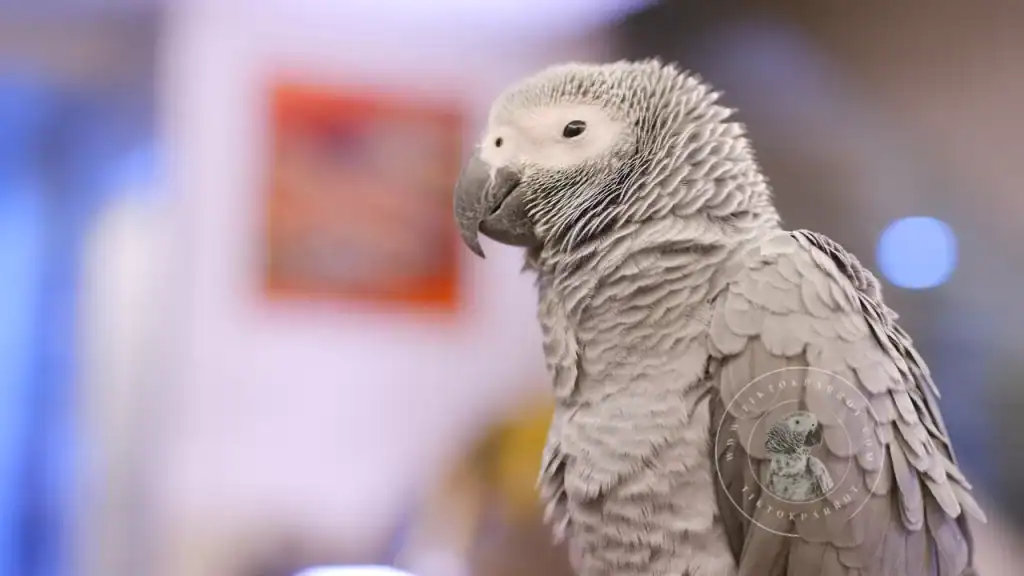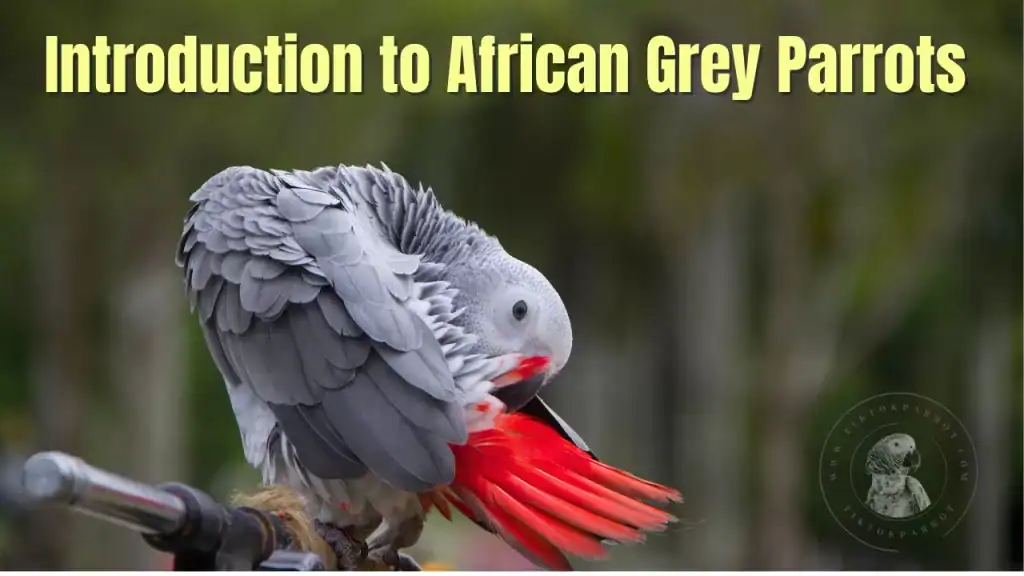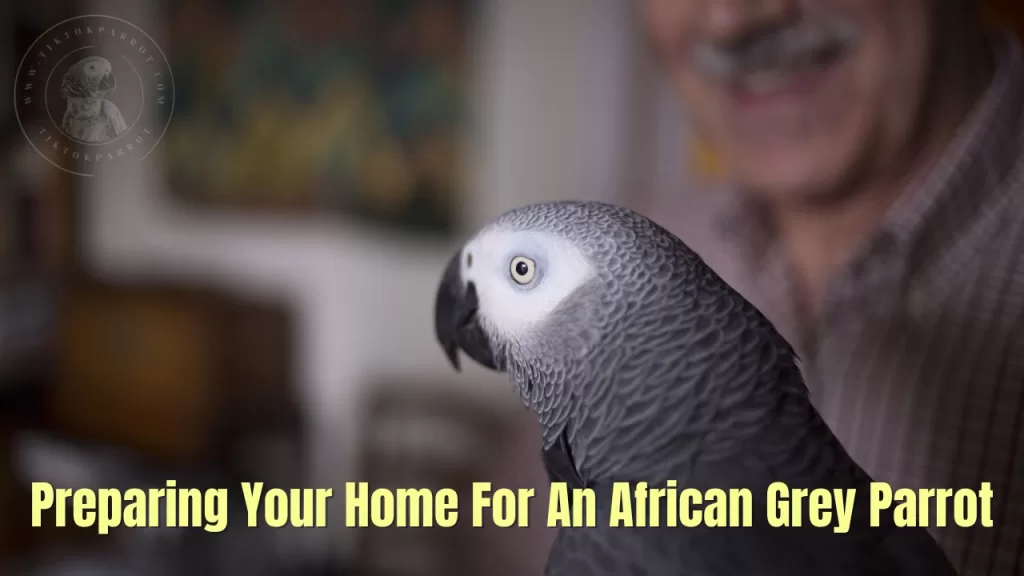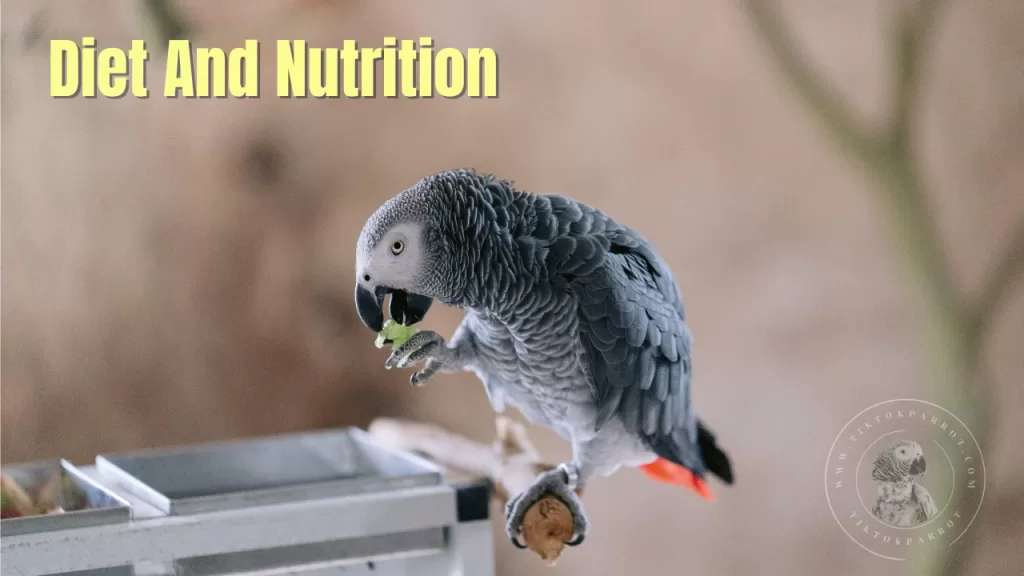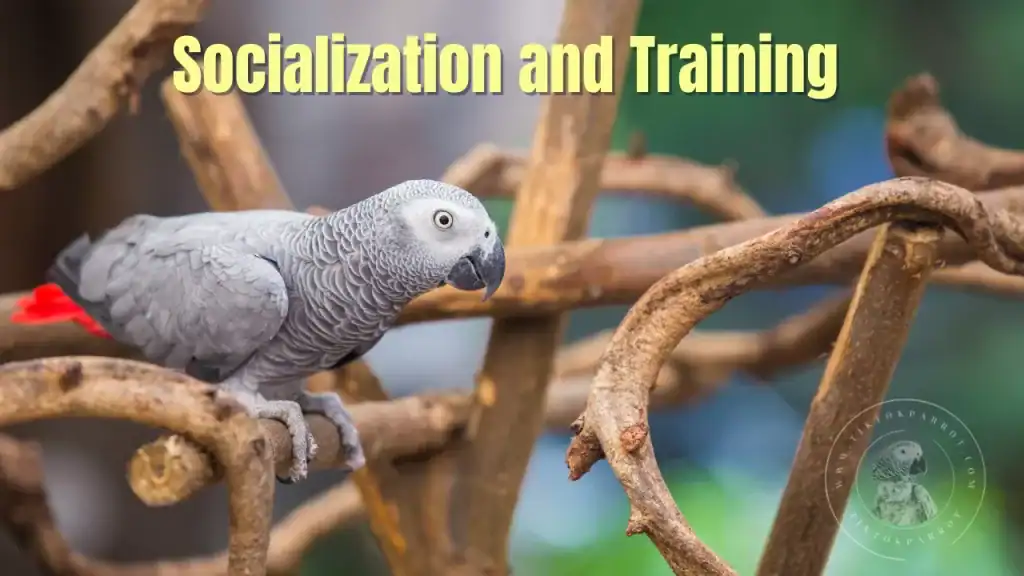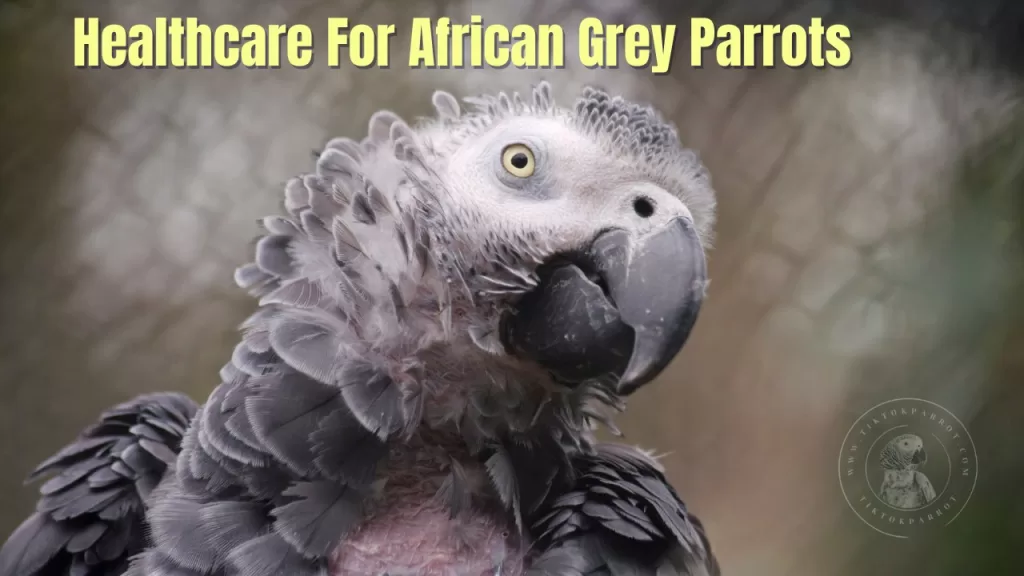If you are an avid bird lover who wants to rear an African Grey parrot while it is still very young, congratulations and best of luck! Rearing a baby parrot is a difficult task which should not be taken lightly.
Why? Improper rearing of baby parrots oftentimes result to behavior problems while growing up. In turn, the behavior problems they learn when still young can stick like glue and prove difficult to remove or modify.
Discover the essentials of raising a young African Grey Parrot, from creating a safe environment and balanced diet to socialization and healthcare. Uncover expert tips for a happy, healthy, and well-adjusted pet.
In essence, rearing a young African Grey parrot is a work that entails a lot of sacrifice, perseverance, and patience on the part of the parrot breeder or the brave parrot owner. It is a matter that must be thought out carefully as improper rearing of a young parrot can make the pet neurotic, and his eventual master to become just as neurotic from the pet parrot’s neurotic behavior, as well.
Here are some helpful tips on rearing a young African Grey parrot:-
First, a baby African Grey parrot should be weaned from bird formula that is hand-fed by a syringe. The baby parrot should become accustomed to eating solid food, in much the same way that an infant should progress from plain milk to soft food.
To introduce another foodstuff, you can feed the baby African Grey with pureed fruits and vegetables. It is advisable to hand-feed or spoon-feed the bird pureed raw fruits and vegetables to keep their vitamin and mineral content intact.
Second, when the baby African Grey parrot is used to eating semi-solid food, you can introduce bird seeds. This is done to make your pet accustomed to the different tastes of food that he will eventually enjoy when he is old enough. After seeds are introduced, the pet owner can offer small bite-size pieces of raw fruits and vegetables.
Third, you can start training your baby African Grey parrot to respond to simple commands. You might need to teach him “up”, “down”, and “no”, as these are three of the most important commands that you will be giving your pet. If your baby parrot understands the concepts, he will respond to them positively in the long run. Enough repetition of the commands will get your parrot to obey your orders in a short time.
Fourth, you can encourage your baby African Grey parrot to talk. However, do not try to remove your pet from its cage when you don’t need to. African Grey parrots are generally shy birds. They do not like it when they are moved around much.
Just keep talking to your pet parrot as if he were a person. Don’t mind that he doesn’t answer. Baby African Grey parrots cannot talk until they are about 18 months old. You can be sure that your pet is listening and is just storing words in his brain for future use.
Fifth, you can start socializing with your young African Grey parrot. Interaction with his owner and other people is of primary importance if he is to become a healthy and well-adjusted parrot. As these parrots are naturally shy, it is best to introduce them gradually to other people so that he doesn’t freak out when he sees many strangers or a lot of people inside the house.
For new owners, let’s delve deep into the history of African grey parrots, their lifespan, diet, socialization, training, healthcare, and how to prepare your home for the arrival of the bird.
Introduction to African Grey Parrots
The African Grey Parrot’s Origin and Habitat
There are two types of African Grey parrots, scientifically known as Psittacus erithacus, are native to the rainforests of West and Central Africa. They are admired for their intelligence and striking appearance, featuring a combination of grey feathers and a vibrant red tail. These parrots are popular pets due to their advanced problem-solving skills, impressive vocal mimicry, and close bonding with their human caretakers.
Personality Traits and Lifespan
African Greys are known for their curious and social nature. They can develop strong bonds with their caretakers and enjoy engaging in various activities. However, they can also be sensitive and require consistent routines to feel secure. African Greys typically live between 40 to 60 years or even up 80 years if well looked after, so prospective owners must be prepared for a long-term commitment.
Preparing Your Home For An African Grey Parrot
Choosing the Right Cage
To accommodate the size and activity level of an African Grey Parrot, invest in a spacious cage with sturdy bars. Ensure there is enough room for your parrot to stretch its wings, climb, and play. The cage should also be easy to clean and provide a secure environment for your pet.
Providing Toys and Enrichment
African Greys are highly intelligent and need mental stimulation to prevent boredom and stress. Provide a variety of toys, such as puzzles, foraging toys, and chewable items. Rotate toys regularly to maintain your parrot’s interest.
Creating a Safe Environment
Ensure that your home is free of hazards such as toxic plants, open water sources, and electrical cords. Additionally, keep the room temperature between 65-80°F and provide natural light for your African Grey.
Diet And Nutrition
Balanced Diet for African Grey Parrots
A balanced diet is crucial for the health and well-being of your African Grey. Provide a mix of high-quality pelleted food, fresh fruits, vegetables, and occasional protein sources like cooked lean meats or legumes. Offer a variety of foods to ensure your parrot receives essential vitamins and minerals.
Foods to Avoid
Avoid feeding your African grey avocado, chocolate, caffeine, alcohol, or foods high in salt and sugar. These substances can be toxic to parrots and cause severe health problems.
Socialization and Training
Importance of Socialization
African Grey Parrots are social animals that thrive on interaction with their human family members. Spend quality time with your parrot daily, including talking, playing, and offering positive reinforcement. Proper socialization will strengthen your bond and ensure a well-adjusted, happy parrot.
Tips for Training Your African Grey
- Start early: Begin training your African Grey as soon as it becomes comfortable in its new home. Young parrots are more receptive to learning new behaviors.
- Be consistent: Establish a consistent training routine with clear commands and expectations. Consistency helps your parrot understand and remember what is being taught.
- Use positive reinforcement: Reward your parrot with treats or praise for good behavior. This approach reinforces desired actions and helps build trust between you and your pet.
- Be patient: Training takes time and effort. Remain patient and celebrate small successes along the way.
Healthcare For African Grey Parrots
Regular Checkups
Schedule regular checkups with an avian veterinarian to ensure your African Grey stays healthy. These appointments allow for early detection and treatment of potential health issues.
Signs of Illness
Monitor your parrot for signs of illness, such as changes in appetite, weight loss, lethargy, or abnormal droppings. Consult an avian veterinarian if you notice any of these symptoms.
My Final Thoughts
Rearing a young African Grey Parrot requires commitment, time, and effort. Providing a safe environment, balanced diet, mental stimulation, socialization, and proper healthcare will ensure a happy, healthy life for your feathered companion.
Frequently Asked Questions
- How do I know if my African Grey Parrot is happy?
A happy African Grey will be active, inquisitive, and engage in play. They will also display relaxed body language and interact positively with their caretaker.
- Do African Grey Parrots need a companion?
While African Greys are social animals, they can thrive with just human companionship if provided enough attention and interaction. However, if you are unable to spend adequate time with your parrot, consider adopting another bird as a companion.
- How often should I clean my African Grey Parrot’s cage?
Clean the cage daily by removing waste and uneaten food. Perform a thorough cleaning, including disinfecting the cage and changing the bedding, at least once a week.
- Can African Grey Parrots learn to talk?
Yes, African Greys are known for their exceptional vocal mimicry skills. With proper training and socialization, they can learn to mimic human speech and other sounds.
- Are African Grey Parrots good for families with children?
African Greys can be suitable for families with children, provided that the children are taught to handle and interact with the parrot respectfully. Always supervise interactions between children and pets.
- How can I tell the age of an African Grey Parrot?
Determining the exact age of an African Grey Parrot can be challenging, especially if there is no information available from the breeder or previous owner. In some cases, an avian veterinarian may be able to estimate the age based on physical characteristics, such as the development of the iris or feather condition.
- Do African Grey Parrots need to be bathed?
Yes, African Greys benefit from regular baths to maintain proper feather health and cleanliness. Offer a shallow dish of lukewarm water or use a gentle mist spray to bathe your parrot. Frequency may vary, but aim for at least once a week.
- What is the best way to clip an African Grey Parrot’s nails?
Clipping your African Grey’s nails should be done carefully to avoid injury. Use specially designed bird nail clippers or a nail file, and only trim the tips to avoid cutting the blood vessels. If you’re unsure, consult an avian veterinarian or a professional groomer.
- How can I prevent my African Grey Parrot from becoming bored?
To prevent boredom, provide a variety of toys, puzzles, and perches to keep your parrot mentally stimulated. Rotate the toys regularly and engage in interactive play with your bird daily. Training and socialization also help prevent boredom.
- What should I do if my African Grey Parrot starts plucking its feathers?
Feather plucking can be a sign of stress, boredom, or an underlying health issue. Consult an avian veterinarian to rule out any medical conditions. If the issue is behavioral, address the root cause by providing more mental stimulation, social interaction, or adjusting the environment to reduce stress.
- How can I teach my African Grey Parrot to step up onto my hand?
Use positive reinforcement and treats to encourage your parrot to step up onto your hand. Place your hand near the bird’s feet and gently press against its chest while saying “step up.” Reward the bird with a treat when it steps onto your hand. Be patient and practice regularly.
- Can African Grey Parrots be housed with other parrot species?
It is generally not recommended to house African Greys with other parrot species, as they may not be compatible and could become aggressive towards each other. If you want to keep multiple birds, consult an avian specialist for advice on suitable companions.
- How do I know if my African Grey Parrot is male or female?
It is difficult to visually determine the sex of an African Grey Parrot, as both sexes have similar appearances. To accurately determine the sex, a DNA test or a surgical sexing procedure can be performed by an avian veterinarian.
- Is it safe to let my African Grey Parrot fly around my home?
Before allowing your African Grey to fly freely in your home, ensure the environment is safe and free of hazards, such as open windows, ceiling fans, and toxic plants. Supervise your parrot during free-flight time and consider wing-clipping if safety is a concern.
- Do African Grey Parrots need vaccinations?
While there are no specific vaccinations required for African Grey Parrots, regular checkups with an avian veterinarian are essential for maintaining your bird’s overall health. Your veterinarian will advise you on any necessary preventative measures based on your parrot’s individual needs.
If you found this blog helpful, It would be great if you could share it with your family and friends who might find it useful as well.
You might like to read these as well 🙂
African Grey Parrot Male or Female? (Determine Gender of African Grey)
How can you determine the age of an African grey parrot?
Breaking the Myths: The Truth About African Grey Parrot Eggs
African Grey Parrot Price & Owning Cost
Types of African Grey Parrots
How to Breed African Grey Parrots
Unlock the Secrets of Choosing the Perfect African Grey Parrot
Is Your African Grey a Jealous Bird? Here’s What You Need to Know!
African Grey vs Amazon – A Comparison of Two Popular Pet Birds
The Battle of the Birds: African Grey Parrot vs Crows
What To Do If Your Parrot Is Choking, something stuck in the throat?
The Importance of a Cage for Your African Grey Parrot
The Surprising Benefits of Owning an African Grey Parrot
Surprising facts about African Grey Parrots
African Greys 101: Avoid These Common Mistakes and Keep Your Parrot Thriving!
For more useful content about African grey parrots, you can subscribe my site with your email to get notification upon publishing a new blog, the subscribe box you can see on the right side of this page. Also if you get an alert on your web browser while browsing my site, allow it and that will also give you an alert whenever I publish a new blog. 🙂
Stay safe and much love !



